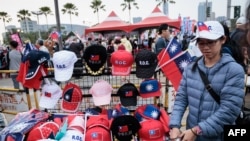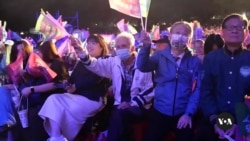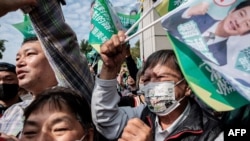Taiwan will hold its contentious presidential and legislative election on January 13, with millions of Taiwanese voters expected to vote and elect a new president to lead the democratic island amid heightened tensions across the Taiwan Strait.
Some analysts say the election outcome could significantly impact Taiwan’s direction in the next four years and the dynamics between China and Taiwan.
“It's going to be a matter of whether or not we get more of the same level of tension across the Taiwan Strait or if we see a reset of cross-strait relations,” Lev Nachman, a political scientist at National Chengchi University in Taiwan, told VOA by phone.
In his view, if the ruling Democratic Progressive Party (DPP) wins a third consecutive term, cross-strait tensions would likely remain high. And if the China-friendly Kuomintang (KMT) party returns to power for the first time since 2016, tensions across the Taiwan Strait may be reduced.
Since cross-strait relations have traditionally been the issue that defines presidential elections in Taiwan, the three candidates have been doubling down on relevant rhetoric on the campaign trail in recent weeks.
DPP’s Lai Ching-te, Taiwan’s current vice president, has been framing the election as a choice between democracy and autocracy. He criticized Beijing’s attempt to interfere in the election and vowed to “use democracy as a compass” to guide Taiwan through “the turbulent international situation.”
Presenting the KMT as the peacemaker, the party’s presidential candidate Hou Yu-ih, a former police chief, characterizes the election as a choice between “war and peace.” He accused the DPP of pushing Taiwan to the brink of war with China and urged voters to use their votes to ensure stability across the Taiwan Strait.
Seeking to present himself as an alternative to the two main political parties, Ko Wen-je from the Taiwan People’s Party (TPP), a medical-doctor-turned-former-mayor, described the relationship between China and Taiwan as “a tumor” that should be left alone and said cross-strait relations should be handled with a combination of deterrence and the will to communicate.
Confronted with three presidential candidates who have presented different approaches to handling cross-strait relations, Taiwanese voters are also divided.
Some DPP supporters told VOA that Lai is the only candidate who is committed to safeguarding Taiwan’s democratic way of life while several KMT supporters believe the China-friendly opposition party can help resume dialogue and even official communication between both sides of the Taiwan Strait.
“I believe the KMT candidates can help bring peace back to the Taiwan Strait because they are willing to hold dialogue with Beijing, unlike the DPP, which has been taunting China by being too close to the U.S.,” Chang Shu-Shian, a 68-year-old retiree in Taipei, told VOA.
While supporters of the two main parties view cross-strait relations as an important factor that determines which candidate they support, some young voters think it’s important to give a new party like the TPP, which emphasizes addressing long-standing social and economic issues troubling young Taiwanese people, a chance in the upcoming election.
“I want to show the two main political parties that voters care about more than just cross-strait relations,” Stanley Chiou, a 36-year-old engineer in Hsinchu, told VOA by phone.
Since Lai from the DPP has vowed to continue Taiwan President Tsai Ing-wen’s foreign policy and cross-strait agenda, some experts think his potential victory could ensure ties between Taiwan and the U.S. remain robust while Beijing would likely impose greater pressure on Taipei.
“Given that in recent months, Beijing's various departments and government agencies have already labeled Lai as a troublemaker and as someone who is pro-independence, I think it is likely that we will see an increase in both economic and military pressures [from Beijing] following a potential Lai win,” Amanda Hsiao, senior China analyst at the International Crisis Group, told VOA in a video interview in Taiwan.
Other analysts say a potential KMT victory may be viewed as a setback for the Biden administration’s foreign policy since the U.S. has provided Taiwan with a lot of support in recent years.
“Given the fact that U.S. President Joe Biden has repeatedly said the U.S. would come to Taiwan’s defense in the event of a Chinese military invasion, if Taiwanese people still choose a government favoring closer ties with China, it would mean Taiwanese people have less trust in Biden’s policies,” Austin Wang, an expert on Taiwan politics at University of Nevada, Las Vegas, told VOA by phone.
Apart from showing the lack of trust in Biden’s policies in Taiwan, the victory of a China-friendly new administration would also affect the U.S. election and Washington’s strategy in the Asia Pacific, Wang said.
Since Nachman, of the National Chengchi University, and Wang both think Taiwan would likely have a divided government after Saturday’s election, they say disagreements between different branches of the government could surface over contentious issues, such as how to handle cross-strait relations and Taiwan’s defense budget.
“From current President Tsai Ing-wen’s perspective, her goal is to try to cement as much policy as she can before she’s out of office,” Nachman told VOA. “A lot of the decisions that she’s made regarding issues such as defense spending can’t just be undone with a snap of a finger.”








